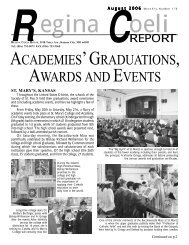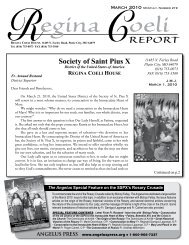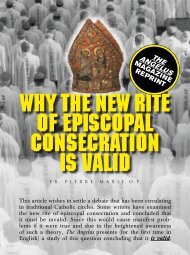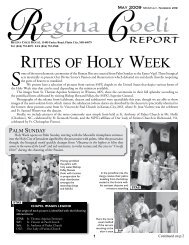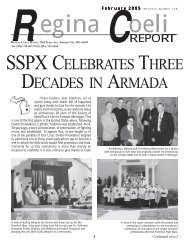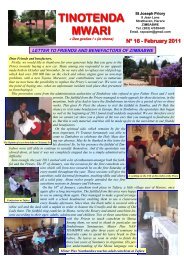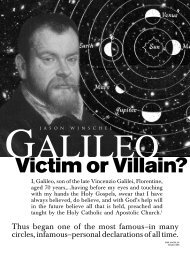Is Feeneyism Catholic? - Society of St. Pius X
Is Feeneyism Catholic? - Society of St. Pius X
Is Feeneyism Catholic? - Society of St. Pius X
Create successful ePaper yourself
Turn your PDF publications into a flip-book with our unique Google optimized e-Paper software.
42 IS F EENEYISM C ATHOLIC?<br />
In conclusion, let us not introduce a private interpretation <strong>of</strong><br />
the Holy Scripture in opposition to that <strong>of</strong> the Fathers, but rather<br />
“hold fast to the doctrine <strong>of</strong> the Fathers,” 56 Doctors, and popes.<br />
The Authority <strong>of</strong> Popes and Councils<br />
The followers <strong>of</strong> Fr. Feeney <strong>of</strong>ten quote three infallible 57 pronouncements<br />
<strong>of</strong> popes, viz., Innocent III in the Fourth Lateran<br />
Council, Boniface VIII in Unam Sanctam, and Eugene IV in the<br />
Council <strong>of</strong> Florence. However, they misinterpret these definitions,<br />
by disregarding the teaching <strong>of</strong> the very same popes, sometimes<br />
within the very same council! And they disregard the teaching<br />
<strong>of</strong> other popes and councils. The root <strong>of</strong> their error is to think<br />
that baptism <strong>of</strong> blood and baptism <strong>of</strong> desire are incompatible<br />
with the dogma Extra Ecclesiam nulla salus. In no way does this<br />
dogma exclude baptism <strong>of</strong> blood and baptism <strong>of</strong> desire, as we<br />
shall see.<br />
INNOCENT III AND THE FOURTH LATERAN COUNCIL<br />
In 1215, this pope convoked this council against the Albigenses,<br />
etc., and imposed on them a pr<strong>of</strong>ession <strong>of</strong> faith which contains:<br />
“I believe firmly and pr<strong>of</strong>ess simply that... there is one universal<br />
Church <strong>of</strong> the faithful, outside <strong>of</strong> which absolutely no one<br />
is saved...” (Dz. 430). Clearly he does not speak <strong>of</strong> baptism, but <strong>of</strong><br />
belonging to the Church. The very same pope, a few years earlier,<br />
twice explicitly taught baptism <strong>of</strong> desire and approved the teaching<br />
<strong>of</strong> <strong>St</strong>. Augustine and <strong>St</strong>. Ambrose! Hence, one ought to conclude<br />
that this teaching is not opposed to the dogma.<br />
Moreover, <strong>St</strong>. Thomas Aquinas and <strong>St</strong>. Bonaventure, two<br />
great doctors <strong>of</strong> the Church, were teaching explicitly the doctrine<br />
<strong>of</strong> baptism <strong>of</strong> blood and baptism <strong>of</strong> desire just a few years after<br />
this council; had this council meant a condemnation <strong>of</strong> this doctrine,<br />
they would certainly have been reproached for it by their<br />
adversaries, which was not the case. And they would never have<br />
been declared Doctors <strong>of</strong> the Church had they taught a doctrine<br />
56 Dz. 388, Pope Innocent III.<br />
57 It is not here the place to discuss whether they are infallible in virtue <strong>of</strong> the<br />
extra-ordinary magisterium, or in virtue <strong>of</strong> the ordinary magisterium. Let it<br />
be sufficient to agree that they are infallible.



